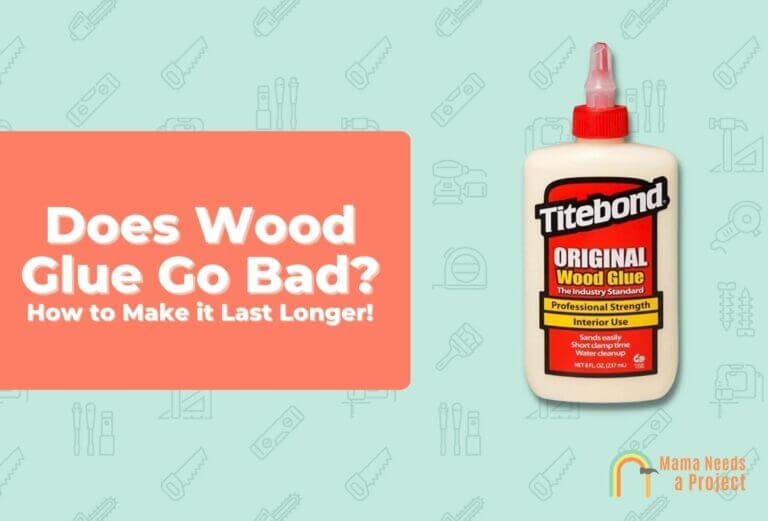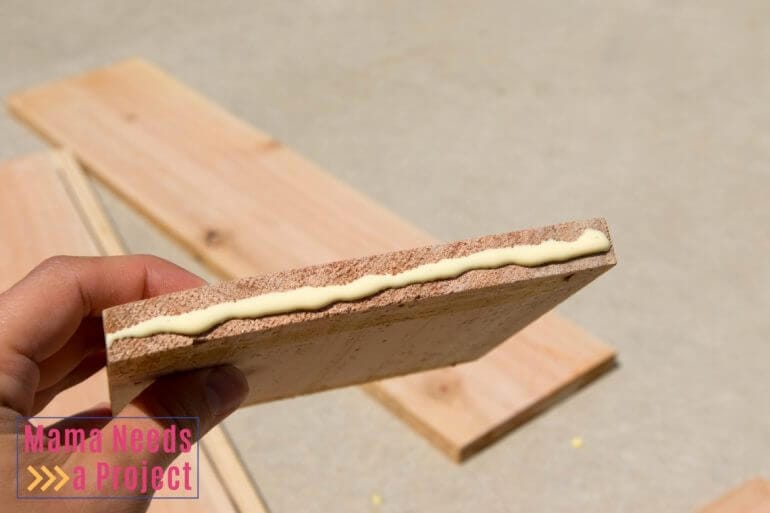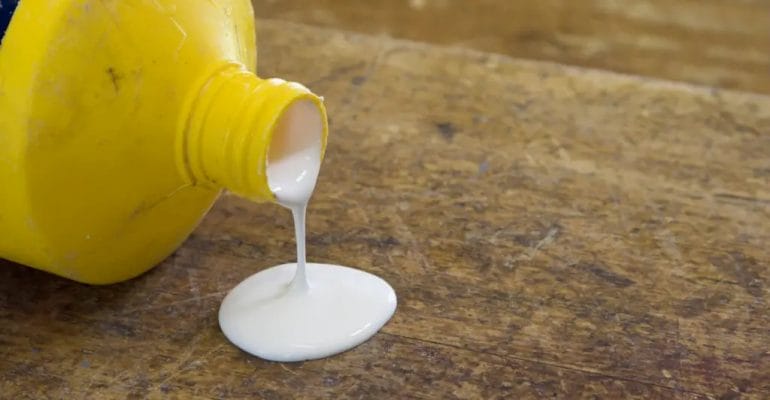Wood glue is a common adhesive used in various woodworking projects. However, like any other product, it does have a shelf life and can eventually expire. The expiration date of wood glue depends on various factors such as its formulation, storage conditions, and brand. It is important to check the label or packaging for the expiration date. Using expired wood glue may result in weakened bonds and compromised project integrity. So, it is advisable to use fresh and unexpired wood glue for the best results.

Signs of Expired Wood Glue
Wood glue is a vital adhesive used in woodworking projects to bond pieces of wood together. However, over time, wood glue can expire and lose its effectiveness. It is important to be able to recognize the signs of expired wood glue to ensure that your projects are successful. Here are some key indicators that your wood glue may have gone bad:

1. Change in Consistency
One of the first signs of expired wood glue is a change in its consistency. If the glue becomes thicker, lumpy, or develops a gel-like texture, it is likely that the adhesive has started to deteriorate. Expired wood glue may also become watery or runny, indicating a loss of its adhesive properties.
2. Foul Odor
Another noticeable sign of expired wood glue is a strong, unpleasant odor. Fresh wood glue typically has a mild scent that dissipates quickly. However, if you detect a pungent or sour smell, it is a clear indication that the glue has deteriorated and should not be used.
3. Failure to Bond
If your wood glue is no longer forming strong bonds between pieces of wood, it is likely expired. Expired wood glue may not provide the necessary adhesive strength, resulting in weak or failed joints. If you notice that your glued joints are easily separating or not holding up well, it may be time to replace your wood glue.
4. Extended Drying Time
Expired wood glue may take significantly longer to dry compared to fresh adhesive. If you find that your wood glue is not setting within the expected drying time mentioned on the product label, it could be a sign that the glue has expired. Extended drying time indicates a loss of adhesive properties and may compromise the strength of the bond.
5. Visible Mold or Contamination
A notable sign of expired wood glue is the presence of visible mold or contamination in the adhesive. Mold growth can occur when the wood glue has been exposed to moisture or stored in unfavorable conditions for an extended period. Moldy or contaminated wood glue should never be used, as it may compromise the integrity of the bond and affect the overall quality of your woodworking project.
It is important to note that using expired wood glue can result in weak or failed bonds, which can lead to safety hazards and unsatisfactory project outcomes. Therefore, if you observe any of the signs mentioned above, it is best to dispose of the expired wood glue properly and obtain a fresh and reliable adhesive for your woodworking needs.

Effects of Using Expired Wood Glue
Wood glue is commonly used in woodworking projects to bond pieces of wood together. It provides a strong and durable joint when used correctly. However, if you use expired wood glue, it can have several negative effects on your project and the overall quality of the bond.
1. Weakened Bond
Using expired wood glue can result in a weakened bond between the pieces of wood. As the glue ages, its chemical composition changes, leading to a loss of adhesive properties. This can cause the bond to be less strong and durable, resulting in a higher risk of the joint breaking or coming apart over time.
2. Poor Adhesion
Expired wood glue may also have poor adhesion properties. Adhesion refers to the ability of the glue to stick to the wood surface. When the glue expires, it may lose its ability to effectively adhere to the wood, resulting in a weaker bond. This can lead to gaps or separation between the wood pieces, compromising the structural integrity of the project.
3. Longer Drying Time
When using expired wood glue, you may notice that it takes longer to dry compared to fresh glue. This prolonged drying time can be frustrating, especially when you need to continue working on your project or apply pressure to the joint. Waiting for the glue to dry can increase the overall project completion time and cause delays in the woodworking process.
4. Reduced Shelf Life
Expired wood glue has a reduced shelf life compared to fresh glue. This means that even if you have a partially used bottle of expired glue, it may not perform as expected. Over time, the adhesive properties of the glue can degrade, making it less effective in creating a strong bond. It is important to regularly check the expiration date of your wood glue and replace it when necessary to ensure optimal results.
5. Compromised Aesthetics
In addition to the structural issues, using expired wood glue can also affect the aesthetics of your woodworking project. As the glue deteriorates, it may become discolored or develop a thicker consistency. This can result in visible residue or uneven glue lines, which can detract from the overall appearance of the finished piece.
Summary
Using expired wood glue can have detrimental effects on the quality of your woodworking projects. It can weaken the bond between wood pieces, result in poor adhesion, and increase drying time. Additionally, expired glue has a reduced shelf life and can compromise the aesthetics of your project. It is essential to use fresh, unexpired wood glue to ensure a strong and durable bond in your woodworking endeavors.

Proper Storage of Wood Glue: Tips to Extend the Shelf Life
Wood glue is an essential adhesive used in woodworking projects, and it is crucial to store it properly to ensure its effectiveness and longevity. Improper storage can lead to a shorter shelf life and a waste of your valuable resources. In this section, we will discuss some tips and guidelines for storing wood glue to extend its shelf life.
1. Seal the Container Properly
When not in use, always make sure to seal the container tightly. Wood glue is sensitive to air exposure, and any contact with air can result in the glue drying out faster. Use the manufacturer’s original container or transfer the glue to an airtight container if needed. This will prevent air from entering and keep the glue fresh for a longer period.
2. Store in a Cool and Dry Place
It is important to store wood glue in a cool and dry place, away from direct sunlight and extreme temperatures. Heat and moisture can negatively affect the glue’s consistency and bonding properties. Consider storing it in a basement, garage, or a dedicated storage area with stable temperature and humidity levels.
3. Avoid Freezing
While it is essential to keep wood glue away from extreme heat, freezing temperatures can also be detrimental. Freezing can cause the glue to separate and lose its adhesive properties. Do not store wood glue in unheated areas or expose it to freezing temperatures.
4. Keep Away from Children and Pets
Wood glue can be harmful if ingested or mishandled. To ensure safety, store the glue in a place that is inaccessible to children and pets. Consider using locked cabinets or high shelves to prevent accidental exposure.
5. Check for Clumping or Separation
Before using wood glue, always check for any signs of clumping or separation. If the glue appears to be lumpy or has separated into different layers, it may have expired or been stored improperly. In such cases, it is best to discard the glue and purchase a new one.
6. Rotate Stock and Check Expiration Dates
If you frequently use wood glue, it is advisable to rotate your stock and use the oldest containers first. This ensures that you are using the freshest glue available and reduces the chances of using expired products. Additionally, check the expiration dates on the containers and dispose of any expired glue.
7. Clean the Container Rim
After each use, wipe the container rim clean to remove any excess glue. Residual glue on the rim can dry and form a seal, making it difficult to open the container later. A clean rim ensures a proper seal and easy access to the glue in the future.
8. Use a Moisture Barrier for Long-Term Storage
If you plan to store wood glue for an extended period, consider using a moisture barrier such as a desiccant packet or silica gel. These absorb moisture and help maintain the glue’s quality. Place the moisture barrier inside the container before sealing it tightly.
In summary, proper storage of wood glue is essential to extend its shelf life and maintain its adhesive properties. Seal the container tightly, store in a cool and dry place, avoid freezing temperatures, and keep it away from children and pets. Regularly check for clumping or separation and rotate your stock to use the oldest containers first. Clean the container rim after each use and consider using a moisture barrier for long-term storage. By following these tips, you can ensure that your wood glue remains effective and ready for your woodworking projects.
Alternative Options to Expired Wood Glue
Wood glue is a common adhesive used in woodworking projects to bond pieces of wood together. However, like any other product, wood glue has a shelf life and can expire over time. If you find yourself in a situation where your wood glue has expired and you need to complete a project, don’t worry! There are several alternative options you can consider to still achieve a strong and durable bond.
Cyanoacrylate Glue (Super Glue)
Cyanoacrylate glue, commonly known as super glue, is a strong adhesive that can be used as an alternative to expired wood glue. It bonds quickly and securely, making it ideal for small woodworking projects or repairs. However, keep in mind that super glue is not as flexible as wood glue, so it may not be the best option for projects that require flexibility.
Epoxy Resin
Epoxy resin is another alternative to expired wood glue. It consists of two components, a resin and a hardener, which need to be mixed together before application. Epoxy resin provides a strong and waterproof bond, making it suitable for outdoor projects or items that will be exposed to moisture. However, it is important to follow the instructions carefully and allow sufficient curing time for the epoxy to fully harden.
Polyurethane Glue
Polyurethane glue, also known as PU glue, is a versatile adhesive that can be used as an alternative to expired wood glue. It is known for its excellent bonding strength and ability to bond different materials together, including wood, metal, and plastic. Polyurethane glue expands as it cures, filling gaps and creating a strong bond. However, it can be messy to work with and requires clamping during the curing process.
Hide Glue
If you prefer a more traditional approach, hide glue can be a suitable alternative to expired wood glue. Hide glue is made from animal collagen and has been used for centuries in woodworking. It provides a strong bond and is reversible, meaning it can be easily repaired or disassembled if needed. However, hide glue requires special preparation and application techniques, including heating the glue before use.
PVA Glue (White Glue)
Polyvinyl acetate glue, commonly known as PVA glue or white glue, is a widely used adhesive in woodworking. While it may not be as strong as some of the other alternatives, it can still be effective for certain projects. PVA glue is easy to work with, dries clear, and is generally non-toxic. It is most suitable for indoor projects or applications that do not require high levels of strength.
Combination of Options
In some cases, you may find that using a combination of alternative options can provide the desired results. For example, using super glue to bond small parts together and reinforcing the joint with epoxy resin or polyurethane glue can create a strong and reliable bond. It is important to consider the specific requirements of your project and choose the alternative options accordingly.
Summary
When your wood glue has expired, there is no need to panic. There are several alternative options available that can still help you achieve a strong and durable bond. Whether you choose cyanoacrylate glue, epoxy resin, polyurethane glue, hide glue, PVA glue, or a combination of options, it is important to follow the instructions carefully and consider the specific requirements of your project. Remember, selecting the right adhesive is crucial for the success of your woodworking project.
FAQs
Does wood glue expire?
Yes, wood glue does have an expiration date. The typical shelf life of wood glue is around 1 to 2 years. After that, the glue may start to lose its effectiveness and bonding properties. It is important to check the expiration date before using the glue to ensure optimal results.
Conclusion
In conclusion, wood glue does have an expiration date, just like any other adhesive. It is important to check the packaging or label for the date of manufacture to ensure the glue is still usable. Expired wood glue may lose its effectiveness and may not provide a strong bond. When using wood glue for your projects, remember to store it properly in a cool, dry place to extend its shelf life. Additionally, it is recommended to test a small area before applying the glue to your entire project to ensure optimal results.
Using expired wood glue can result in weak joints and compromised durability. It’s always best to use fresh, unexpired wood glue to achieve the strongest bond possible. So, make it a habit to check the expiration date before using wood glue for your woodworking projects. By doing so, you’ll ensure the longevity and quality of your creations.